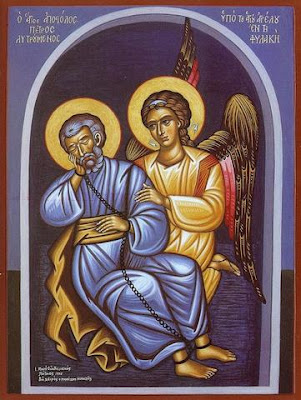
The Third Sunday of Advent is of semi-double rite. The liturgical colour is violet but today at Mass the Deacon wears a dalmatic and the subdeacon a tunicle and the organ may be played.
At Vespers yesterday the antiphons and psalms were sung from the semi-double Office of St. Damasus. The antiphons Ecce sacerdos magnus etc were sung with psalms 109, 112, 115, 125 & 131. From the chapter, Fratres: Gaudete in Domino semper was of the Sunday. The Office hymn was Conditor alme siderum. After the collect of the Sunday a commemoration was sung of St. Damasus. The Suffrages were omitted. At Compline the Dominical preces were sung.
At Mattins the invitatory is Prope est jam Dominus and the hymn is Verbum supernum. In the first nocturn the antiphons Veniet ecce Rex etc are sung with Pss. 1, 2, 3, 6, 7, 8, 9, 10, 11, 12, 13 & 14. The lessons in the first nocturn are taken from the prophet Isaiah. The first lesson is longer than that found in modern editions and continues until the penultimate sentence of the modern second lesson: justitiam discent habitatores orbis. The second lesson begins Misereamur impio... and continues all through the text of the modern third lesson and beyond: Indulsisti genti Dominie ... murmuris doctrina tua eis. The third lesson is absent from the modern editions and begins Sicut quae concepit... and continues until ... non operiet ultra interfectos suos. (vv. 17 -21). In the second nocturn the antiphons Gaude et laetare etc are sung with Pss. 15, 16 and 17. The lessons are taken from a sermon of St. Leo. These are substantially longer than in the modern editions of the Breviary. The sixth lesson text is completely absent from the modern editions. In the third nocturn the antiphons Gabriel Angelus etc are sung with Pss. 18, 19 and 20. The homily is from St. Gregory's writing on St. John's Gospel. These are the same as those found in the modern editions. A ninth responsory, Docebit nos Dominus, is sung and the Te Deum omitted in the Office of Advent.
At Lauds the antiphons Ecce veniet etc are sung with psalms 92, 99, 62-66, Benedicite and 148-149-150. The hymn is Vox clara ecce intonat. As noted above for Vespers the Suffrages are omitted in Advent.
At Prime the first antiphon from Lauds, Ecce veniet, is sung with the usual Dominical psalms 53, 117, 118(i), 118(ii) and Quicumque. In the short responsory the versicle Qui venturus es in mundum replaces Qui sedes ad dexteram Patris. The Dominical preces are sung. At the other Hours the other antiphons of Lauds are sung in the usual order.
Mass is sung after Terce. The ministers wear violet dalmatic and tunicle rather than folded chasubles. The Gloria in not sung, the second collect is of the Blessed Virgin in Advent, Deus, qui de beate, the third collect Ecclesiae. The Creed is sung, the preface is the Common Preface. As the Gloria was not sung, the dismissal is Benedicamus Domino sung by the deacon facing the altar.
Vespers are first Vespers of St. Lucy of Syracuse with a colour change to red. The antiphons Orante Sancta Luciaetc are sung, doubled, with psalms 109, 112, 121, 126 & 147. The antiphon on the Magnificat is In tua potentia etc. After the collect of the feast a commemoration of the Sunday is sung. At Compline the Dominical preces are omitted.
Art: Jerome Nadal























